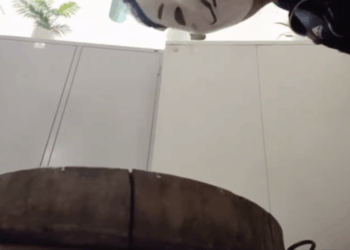I’m a registered Republican who just watched her party spend much of the summer pushing through new cuts to Medicaid. I’m also here to tell you why I’m an unlikely supporter of the program. My son’s life depends on government assistance. Recent cuts to Medicaid at both the federal and state levels mean millions of families like mine could soon be at a loss for how to care for our disabled loved ones.
In February 2021, during a routine ultrasound appointment when I was 17 weeks pregnant with my third child, David, doctors discovered that he had a set of life-threatening fetal anomalies. Our boy had an excruciatingly rare midline cleft lip and palate and was missing critical portions of his brain. We were told he fit the profile for a baby that had trisomy 18 and trisomy 13, or a disorder called holoprosencephaly, when the brain fails to divide appropriately into separate hemispheres. The first days after David’s diagnosis were otherworldly. Each subsequent day of my pregnancy was a nightmare. I became a person in pain.
Expecting David to be stillborn, we were amazed when he was born at term. At the hospital, after M.R.I. scans revealed strange imbalances in the size of his brain, we were told to expect him to die from intractable seizures. To our surprise, we were eventually discharged. There was nothing more to do — no treatments, just waiting. I thought David would die overnight.
But David lived. We celebrated his fourth birthday in July. I do not understand the course of his life; I am simply grateful. David does not walk, talk or eat independently. He is visually impaired and has hearing loss. He has an unrepaired cleft palate open to protruding brain tissue, covered by a thin layer of mucous membrane. Developmentally, David is like a 10-month-old baby. He is our joy, and it is our privilege to parent him.
Caring for David is holy work, but it takes a village. His extensive medical conditions mean he meets the criteria for institutionalized care. But because of Medicaid, David is able to live at home, where he belongs, surrounded by people who love him.
North Carolina’s Community Alternatives Program for Children, or CAP/C, is a home- and community-based services waiver that provides essential services to more than 3,700 children like David across our state. Doctors’ appointments, surgeries, many therapies, adaptive equipment, specialized food, medical supplies, respite care workers (who provide temporary relief to caregivers) and more are all provided for him by Medicaid. I am even paid a living wage to care for my son. David’s life simply wouldn’t be possible without this program — which keeps him healthy and alive. Medicaid is David’s village.
The White House insists that the passage of President Trump’s domestic policy bill won’t affect programs like David’s. I know better. North Carolina’s CAP/C program is majority-funded by federal dollars. States must now consider how to meet anticipated budget shortfalls when federal Medicaid cuts take effect over the next few years. Before the passage of the domestic policy law, when you paid your federal taxes, a fraction of your money helped support children like David through Medicaid. This ensured that their lives remained a communal responsibility and collective effort, reinforcing their value. That moral imperative has now disappeared. Children’s lives are quite literally on the line.
Yet even before the far-reaching impacts from the reduction of federal dollars will be felt, North Carolina state legislators have chosen not to fully fund our existing Medicaid program for the upcoming fiscal year, resulting in a $319 million gap. These dollars can still be appropriated by the state legislature before Oct. 1. But if this funding need goes unmet, there will be real-world consequences for people like David and me, and the rest of our Medicaid village.
North Carolina’s Medicaid program recently shared a variety of potential solutions that may be used to mitigate this funding loss. While CAP/C appears preserved for now, provider rates are set to be cut across the board by amounts ranging from 3 percent to 10 percent.
I am a Medicaid provider because I am paid to care for my son, as are my son’s physical therapists, occupational therapists, primary care physicians, specialists, case managers and others. I expect my provider rate to be reduced by 8 percent effective Oct. 1 if no further action is taken by the state legislature to fully fund the North Carolina Medicaid program. This only fuels more concern about the next round of funding cuts that will result once Mr. Trump’s policy law takes effect. Like all states, North Carolina’s Medicaid program operates by having the federal government match its state spending. So the real impacts of these reductions will be much larger than $319 million. One source estimates that North Carolina will experience a $1.1 billion total reduction in Medicaid services.
Let me be clear: North Carolina’s Medicaid program is being voluntarily reduced, even before federal Medicaid cuts take full effect as a result of Mr. Trump’s signature policy act. While North Carolina is one of the first states to reduce its Medicaid program, cuts like these may soon arrive in other states, too.
Families like mine are struggling to make sense of this rapidly shifting landscape. Lack of clear and accessible information, fear of impending federal cuts and proactive state reductions in Medicaid have left me and others confused and angry. Parents of disabled children don’t have the time to hunt down details buried in evasive political jargon that have the potential to upend their lives. Moms like me are simply trying to keep our heads above water and keep our children alive. Life with a child like David is hard in ways I cannot fully explain — unless you have also cared for a medically fragile, physically disabled and intellectually impaired child 24 hours a day, seven days a week, for four years.
How we care for our most vulnerable reveals what we believe about ourselves. I’m just one mother, and David is just one child. But this affects your neighbors. This affects you. At one point or another most of us will lose our independence, health, rationality and will. Eventually we will rely wholly on someone else to care for us. Dependence, weakness, need of others: These are features, not bugs, of the human experience.
We can testify to this reality with our dollars, knowing that one day we too will be in need like David. I have a pen and you have a phone, a voice and a vote. David has none of these things. If you still believe that your dollar should go to care for people who cannot care for themselves, then you have a moral responsibility to charity. Medicaid is that charity. Whether you live in North Carolina or elsewhere, we all have work to do. Call your state representatives. Ask them to do to others as you would have them do to you, and remember my son and others like him when you do it.
Rachel Roth Aldhizer is a visiting fellow at the Ethics and Public Policy Center.
The Times is committed to publishing a diversity of letters to the editor. We’d like to hear what you think about this or any of our articles. Here are some tips. And here’s our email: [email protected].
Follow the New York Times Opinion section on Facebook, Instagram, TikTok, Bluesky, WhatsApp and Threads.
The post I’m Conservative. My Disabled Son Needs Medicaid to Survive. appeared first on New York Times.




